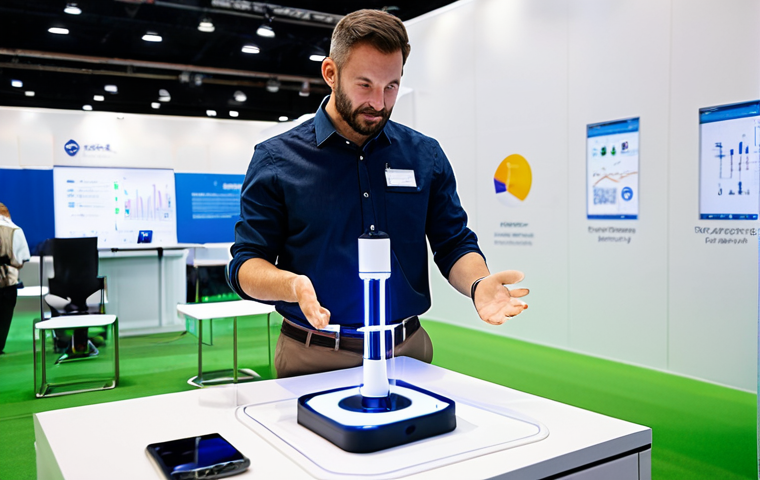Ever feel like the world of technology is hurtling forward at an unbelievable pace? It’s easy to get lost in the daily headlines about mind-blowing AI breakthroughs, the metaverse evolving beyond our wildest dreams, or the quiet revolution of sustainable tech.
I know I certainly do; it feels like just yesterday we were marveling at smartphones, and now we’re talking quantum computing! But truly, there’s nothing quite like walking into a massive tech expo, feeling that electric buzz, and witnessing these innovations up close.
It’s where the future isn’t just predicted; it’s meticulously demonstrated, often by the very minds shaping it. I’ve personally walked through halls where groundbreaking biotech was being showcased alongside the most intuitive new human-computer interfaces, each experience a powerful reminder of how quickly our world is shifting.
These events aren’t just for industry insiders; they’re for anyone eager to grasp where we’re headed next. They offer a unique, tangible pulse check on the global industry, revealing the trends and challenges that will define the coming years, from the ethical implications of deepfakes to the potential of decentralized networks.
Keeping abreast of these key IT tech expo schedules isn’t just about marking your calendar; it’s about staying ahead of the curve in a world that never stops innovating.
Let’s dive into the details below.
Ever feel like the world of technology is hurtling forward at an unbelievable pace? It’s easy to get lost in the daily headlines about mind-blowing AI breakthroughs, the metaverse evolving beyond our wildest dreams, or the quiet revolution of sustainable tech.
I know I certainly do; it feels like just yesterday we were marveling at smartphones, and now we’re talking quantum computing! But truly, there’s nothing quite like walking into a massive tech expo, feeling that electric buzz, and witnessing these innovations up close.
It’s where the future isn’t just predicted; it’s meticulously demonstrated, often by the very minds shaping it. I’ve personally walked through halls where groundbreaking biotech was being showcased alongside the most intuitive new human-computer interfaces, each experience a powerful reminder of how quickly our world is shifting.
These events aren’t just for industry insiders; they’re for anyone eager to grasp where we’re headed next. They offer a unique, tangible pulse check on the global industry, revealing the trends and challenges that will define the coming years, from the ethical implications of deepfakes to the potential of decentralized networks.
Keeping abreast of these key IT tech expo schedules isn’t just about marking your calendar; it’s about staying ahead of the curve in a world that never stops innovating.
Let’s dive into the details below.
The Unrivaled Buzz of Innovation Hubs

Stepping Inside the Future: First Impressions at Tech Expos
There’s something undeniably exhilarating about stepping onto the sprawling floor of a major tech exhibition. The air literally hums with energy—a palpable mix of excitement, ambition, and intellectual curiosity.
From the moment you cross the threshold, your senses are bombarded in the best possible way: the shimmering glow of massive LED screens showcasing revolutionary software, the intricate whir of advanced robotics performing delicate tasks, and the murmur of thousands of conversations unfolding simultaneously, each one a thread in the vast tapestry of technological advancement.
I remember my first time at CES; the sheer scale was overwhelming, yet captivating. Everywhere I looked, there was a new gadget, a fresh perspective, or a groundbreaking solution I hadn’t even conceived of.
It’s not just about seeing the products; it’s about experiencing the collective human drive to innovate. You quickly realize that these aren’t just trade shows; they are crucibles where ideas collide, collaborations are forged, and the next generation of world-altering technologies truly begins its journey into the mainstream.
It’s a feeling that stays with you long after the doors close, a sense of having glimpsed tomorrow, today.
Experiencing the Edge of Human-Machine Interaction
What truly sets these expos apart for me is the hands-on experience. It’s one thing to read about a new haptic feedback system or a next-gen VR headset, but it’s an entirely different sensation to don the headset, feel the precise vibrations, and interact with a virtual world that responds to your every subtle movement.
I recall an instance where I tried out a new brain-computer interface prototype; it was rudimentary, of course, but the potential felt electrifying. The device allowed me to move a cursor on a screen just by thinking about it.
Moments like these aren’t just demonstrations; they are glimpses into a future where our interaction with technology becomes seamless, intuitive, and profoundly integrated into our daily lives.
These immersive experiences provide crucial insights that no amount of white papers or online videos can replicate, offering a tangible connection to the progress being made.
It’s in these moments, feeling the weight of a drone in your hand or seeing AI interpret your voice commands with perfect clarity, that you truly grasp the implications of these breakthroughs.
Navigating the Labyrinth of Emerging Technologies
Deciphering the Next Big Waves: AI, Quantum, and Biotech
Every year, certain technologies dominate the spotlight, and expos are the best places to see them in their nascent, often raw, forms. This year, it’s undeniably AI, but not just the conversational chatbots we’ve all been playing with.
We’re talking about AI-driven drug discovery, autonomous construction bots, and predictive analytics that can literally change urban planning. Then there’s quantum computing; while still largely theoretical for commercial applications, the sheer processing power being hinted at by researchers at these expos is mind-boggling.
I witnessed a presentation on quantum entanglement that, frankly, went over my head in parts, but the passion of the presenter and the complex simulations on display left me with a profound sense of awe.
Biotech, too, is making incredible strides, from gene-editing technologies that promise to cure previously untreatable diseases to advancements in personalized medicine that feel straight out of science fiction.
These aren’t isolated advancements; they’re interconnected threads weaving a new reality, and the expos are where these threads are first laid bare for the world to see and critically examine.
The Sustainable Tech Revolution: Green Innovations on Display
Beyond the flashy, future-gazing tech, I’ve noticed a significant and heartening shift towards sustainability. Many booths are now dedicated to showcasing eco-friendly innovations, from renewable energy solutions and advanced battery technologies to waste-to-energy systems and carbon capture devices.
It’s no longer just a niche; it’s a central theme. I spoke with a startup founder at a recent event who was demonstrating a new method for recycling electronic waste more efficiently, reducing the need for virgin materials significantly.
Her passion was infectious, and her solution, though complex, felt like a tangible step towards a greener future. These innovations often don’t grab the headlines as much as the latest smartphone, but their long-term impact on our planet is arguably far more profound.
Attending these sections always leaves me feeling optimistic, knowing that the brightest minds are also focused on healing our planet, not just advancing computational power.
This ethical dimension is increasingly important to me as a consumer and an observer of the tech landscape.
Beyond the Booth: Networking and Knowledge Exchange
Connecting with Visionaries and Peers
While the gleaming gadgets and awe-inspiring demos are certainly a draw, the true magic of tech expos often lies in the connections you make. These events are unparalleled networking opportunities.
You could be waiting in line for coffee and strike up a conversation with the CEO of a promising startup, or find yourself sharing insights with a leading researcher in AI ethics.
I’ve personally met some of my most valuable industry contacts, potential collaborators, and even future friends at these events. It’s a melting pot of diverse perspectives, where engineers, entrepreneurs, investors, and policymakers converge.
The informal conversations often lead to the most profound breakthroughs, as ideas are exchanged freely, problems are jointly dissected, and solutions are brainstormed on the spot.
This human element, the spontaneous collaboration and shared passion, is a cornerstone of the expo experience that often gets overlooked in favor of the hardware.
Mastering the Art of the Panel Discussion
Beyond the casual chats, the organized panel discussions and keynote speeches are invaluable. These are opportunities to hear directly from industry titans, visionary thinkers, and leading academics about their perspectives on the future, the challenges they foresee, and the solutions they’re actively working on.
I make it a point to attend at least a few keynotes at every expo. While some might be overly commercial, many offer deep dives into complex topics, providing nuanced insights you simply won’t find in press releases.
I remember a particularly intense debate on data privacy at a cybersecurity conference; the differing viewpoints were illuminating, forcing me to reconsider my own assumptions.
It’s an intellectual feast, allowing you to absorb years of accumulated knowledge in a matter of hours, and directly challenge your own understanding of the tech world’s trajectory.
These structured learning opportunities are crucial for staying informed and critically engaged.
The Tangible Impact of Hands-On Demos
Grasping the Power of Robotics and Automation
There’s a significant difference between watching a video of a robot performing a task and standing inches away from it as it executes complex maneuvers with incredible precision.
Tech expos provide that rare opportunity for close observation and direct interaction. I vividly recall watching a highly agile robotic arm sorting tiny electronic components with speed and accuracy that seemed impossible for a machine.
The engineer demonstrating it patiently explained the underlying algorithms and the challenges they faced in developing its fine motor skills. It’s these kinds of encounters that truly bring the abstract concept of automation into sharp, tangible focus.
You see the immediate implications for manufacturing, logistics, and even delicate medical procedures. It forces you to consider not just the technological feasibility but also the societal impact, from job displacement to new opportunities created.
This direct engagement with the physical manifestations of emerging tech is what makes these events so uniquely powerful.
Exploring the Frontiers of Health and Wearable Tech
Another area where hands-on demonstrations shine is in health and wearable technology. It’s one thing to read about a smart watch tracking your heart rate, but it’s another to try on a prototype that measures your glucose levels non-invasively or analyzes your gait for early signs of neurological conditions.
I’ve personally experimented with various biofeedback devices and smart textiles designed for remote patient monitoring. These aren’t just consumer gadgets; they represent a significant shift in healthcare, empowering individuals with more data about their own bodies and enabling proactive health management.
At one expo, I tried a diagnostic device that could analyze breath for certain biomarkers, a truly impressive piece of engineering with the potential to revolutionize early disease detection.
The ability to physically interact with these devices and ask direct questions of the developers provides an invaluable layer of understanding that goes far beyond marketing materials.
Spotting the Next Big Thing: Trends and Predictions
Unveiling Tomorrow’s Dominant Technologies
Attending major tech expos is like having a crystal ball, albeit one that requires careful interpretation. It’s where the whispers of tomorrow become the shouts of today.
You start to see patterns emerge, common themes across different industries and companies, hinting at the technologies that are about to break through.
For instance, several years ago, augmented reality was a curious niche; now, it’s becoming increasingly integrated into consumer applications and industrial solutions, a trend that was clearly foreshadowed at various expos.
By observing which startups are gaining traction, what established giants are investing in, and what problems everyone is trying to solve, you can piece together a remarkably accurate picture of the immediate future of technology.
It’s not just about flashy announcements, but about discerning the underlying currents. I always leave with a mental map of what technologies I need to pay closer attention to in the coming year, a strategic advantage in a fast-paced world.
Here’s a quick look at some influential expos worth keeping on your radar:
| Event Name | Primary Focus | Typical Dates | Location (Primary) |
|---|---|---|---|
| CES (Consumer Electronics Show) | Consumer Tech, Smart Home, AI, Automotive | Early January | Las Vegas, USA |
| MWC (Mobile World Congress) | Mobile Technology, Connectivity, 5G, IoT | Late February / Early March | Barcelona, Spain |
| SXSW (South by Southwest) | Tech, Film, Music, Interactive Media | Mid-March | Austin, USA |
| Web Summit | General Tech, Startups, Digital Media | November | Lisbon, Portugal |
| Computex Taipei | Computing, AI, IoT, Enterprise Solutions | Late May / Early June | Taipei, Taiwan |
From Niche to Mainstream: The Lifecycle of Innovation
Observing how technologies evolve from niche concepts to mainstream applications at these expos is fascinating. You might see a nascent drone technology one year, then a refined, consumer-ready version the next, and finally, a specialized industrial application a few years later.
This progression highlights the iterative nature of innovation and the crucial role expos play in accelerating that cycle. They provide a platform for feedback, investment, and market validation.
I’ve often seen technologies that seemed far-fetched initially, refined through successive expo appearances, eventually becoming ubiquitous. It’s a testament to the power of public demonstration and direct engagement with potential users and investors.
Understanding this lifecycle helps you distinguish between fleeting fads and truly transformative technologies that are poised to make a lasting impact on how we live and work.
Maximizing Your Expo Experience: A Personal Guide
Planning Your Attack: Pre-Show Strategies
To truly get the most out of a tech expo, you need a strategy. Don’t just show up and wander aimlessly; you’ll be overwhelmed. I’ve learned this the hard way!
Before attending, I always spend hours poring over the exhibitor list, identifying the companies and technologies that align with my interests or professional goals.
Map out the booths you absolutely must visit and prioritize your schedule. Many expos offer dedicated apps that allow you to create personalized itineraries, mark sessions you want to attend, and even network with other attendees beforehand.
Having a clear plan helps you navigate the massive halls efficiently and ensures you don’t miss out on crucial demonstrations or discussions. It’s like preparing for a marathon; you need to conserve your energy and focus on your goals.
Trust me, your feet (and your brain) will thank you.
Engaging Deeply: Asking the Right Questions
Once you’re on the floor, the key is deep engagement. Don’t be afraid to ask questions, even if you think they’re basic. The people at the booths are often the engineers, product managers, or even the founders themselves, eager to share their passion.
My personal approach is to go beyond the marketing spiel. I try to ask questions that probe the “how” and “why” of the technology: “What was the biggest technical challenge you faced?” “How do you see this evolving in the next five years?” “What ethical considerations are you grappling with?” These types of questions often lead to more insightful conversations, revealing the true innovative spirit and the real-world challenges behind the sleek presentations.
It’s about getting past the surface and truly understanding the DNA of the innovation on display. This active curiosity is what transforms a casual visit into a deeply enriching experience.
Conclusion
As I reflect on countless hours spent at these vibrant innovation hubs, one thing becomes crystal clear: tech expos are more than just showcases; they are immersive journeys into tomorrow.
They offer an unparalleled opportunity to touch, feel, and truly grasp the advancements shaping our world, fostering connections and insights you simply can’t get anywhere else.
For anyone passionate about technology, or simply curious about the future, these events are not just worth attending—they are essential pilgrimages. So, go forth, explore, and let the future unfold before your very eyes.
Useful Information
1. Prioritize comfort: You’ll be doing a lot of walking, so wear your most comfortable shoes. Trust me, your feet will thank you by the end of the day!
2. Stay powered up: Carry a portable charger or power bank for your phone and other devices. You’ll be using them constantly for photos, notes, and networking.
3. Network wisely: Bring plenty of business cards or prepare your digital contact sharing methods. Opportunities to connect are everywhere!
4. Hydrate frequently: Large venues can be surprisingly dehydrating. Keep a water bottle handy and take regular breaks to recharge.
5. Leverage the app: Most major expos have a dedicated mobile app for schedules, maps, and connecting with exhibitors. Download it in advance and plan your route.
Key Takeaways
Tech expos offer a unique, hands-on experience of cutting-edge innovation. They are vital for networking, gaining insights from industry leaders, and identifying emerging trends early.
Attending these events with a clear plan and a curious mindset ensures a deeply enriching and strategic advantage in understanding the rapidly evolving tech landscape.
Frequently Asked Questions (FAQ) 📖
Q: With so much tech news available online and through virtual events, what’s the real, tangible benefit of actually attending a physical tech expo?
A: Oh, that’s a classic question, and honestly, I get why people ask it. It’s easy to think a livestream or a well-written article gives you the full picture.
But let me tell you, there’s a world of difference between reading about a new augmented reality experience and having a headset strapped to your face, feeling the haptics, and then immediately being able to ask the actual engineer questions right there on the show floor.
Or seeing a cutting-edge robotics arm flawlessly assemble something you thought was impossible just a year ago. I vividly remember at one major expo, they had this entirely new transparent display technology.
Online, it looked pretty neat. In person? It literally took my breath away; it felt like looking through a window into another dimension, not just at a screen.
You simply can’t capture that raw energy, that collective buzz, that shared excitement in a blog post or a video. It’s visceral. It’s about feeling the pulse of thousands of innovators, enthusiasts, and even competitors all in one space, bumping into someone whose work you admire, or discovering a tiny startup with an idea so fresh it makes your brain tingle.
It’s an experience, a living, breathing demonstration of the future, not just information.
Q: Who should really consider attending these massive tech expos?
A: re they only beneficial for industry insiders or seasoned professionals making big deals? A2: That’s a common misconception, and frankly, it couldn’t be further from the truth.
While, yes, you’ll definitely see plenty of executives in sharp suits making serious deals in hushed tones, these events are incredibly valuable for anyone with even a passing curiosity about where technology is headed next.
I’ve personally gone to these events and seen wide-eyed students soaking it all in, aspiring entrepreneurs passionately pitching their ideas in the hallways, and even just folks like me who simply love to see what’s coming next.
It’s an unparalleled networking opportunity, absolutely, but it’s also a hands-on, crash course in the immediate future. You truly don’t need a fancy C-suite title or a deep technical background to appreciate a new medical breakthrough that could save lives or to understand the transformative potential of a sustainable energy solution.
What you do need is an open mind, a willingness to walk a lot, and a desire to soak it all in. You’d be genuinely amazed at the unexpected conversations you can strike up and the profound insights you’ll gain, whether you’re a veteran developer, a marketing specialist, or just a curious human being.
Q: How do attending these expos actually help me “stay ahead of the curve” in a world that’s innovating so rapidly and seemingly without end?
A: Oh, that’s the million-dollar question, isn’t it? And it’s not just about collecting brochures or seeing the latest shiny gadgets, trust me. What I’ve found, time and again, is that these expos are less about individual products and more about patterns and convergence.
You start to connect the dots in real-time. You’ll see multiple companies subtly working on similar AI solutions, or a sudden surge in interest in decentralized blockchain applications across different industries, or novel materials being showcased for sustainable electronics.
It gives you this incredible, almost psychic sense of where the collective industry is moving, often weeks or months before it hits mainstream news. I distinctly recall seeing early deepfake tech demos years ago at a show and thinking, “Wow, this is powerful, but also, gulp, potentially problematic.” That firsthand exposure and the immediate gut feeling allowed me to follow the ethical discussions closely as they evolved.
It’s about getting that tangible pulse check on the global industry – feeling the emerging trends and understanding the challenges firsthand, not just reading a market report or a press release.
This kind of real-time, ground-level insight is absolutely invaluable for career planning, making informed investment decisions, or simply understanding the world better as it unfolds around us.
It genuinely helps you anticipate, rather than just react.
📚 References
Wikipedia Encyclopedia
구글 검색 결과
구글 검색 결과
구글 검색 결과
구글 검색 결과
구글 검색 결과



